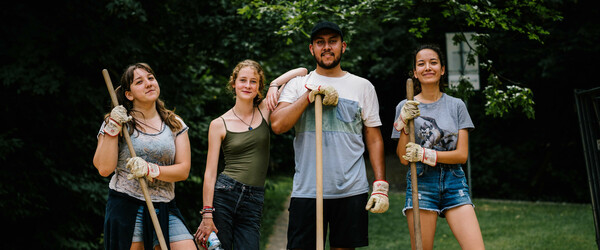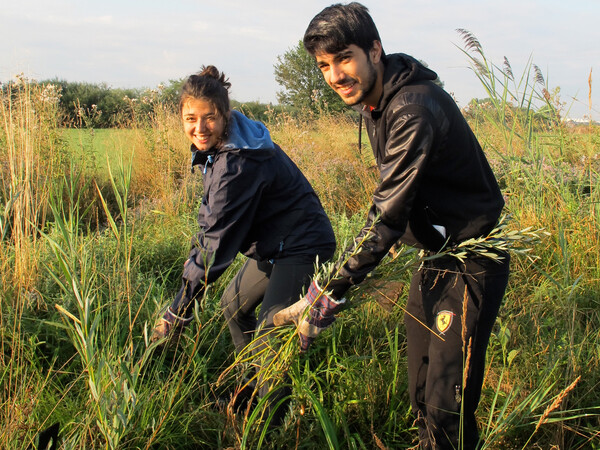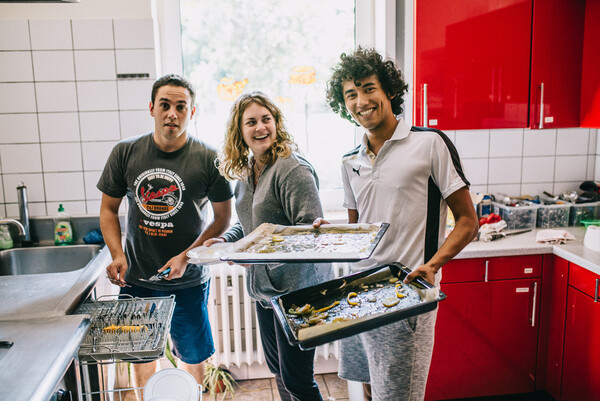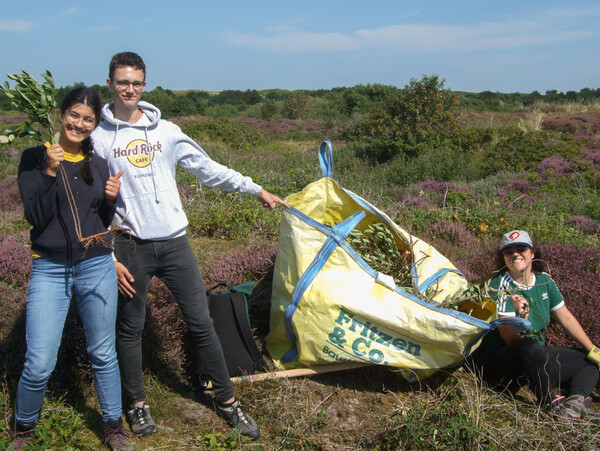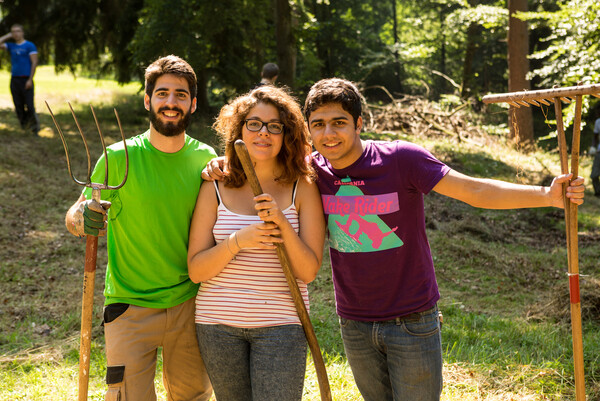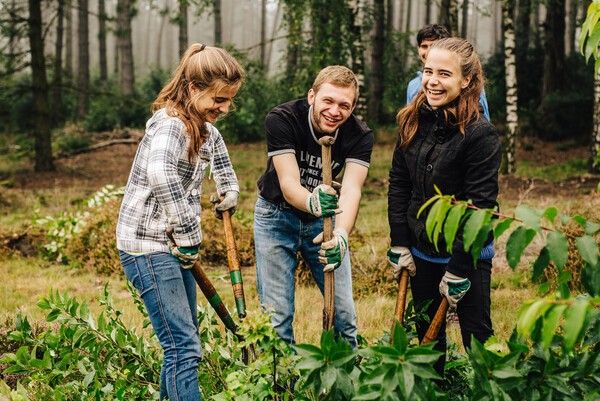Workcamps in Germany
At the international workcamps in Germany, people from around the world come together to spend two to four weeks making a difference. Join an international group of volunteers to work together and help out for a good cause: Planting trees on the edge of the Alps, construction work on an old farm in the Mecklenburg Lakeland, or helping out with running activities for children in the school holidays in Münsterland. Join in and meet the world at a workcamp!
A workcamp in Germany allows you to:
- have an international experience close to home
- meet people from around the world
- make a difference
- experience an unforgettable time for minimal cost
- improve your English
We have been organising workcamps in Germany for over 70 years. This means we have plenty of experience and will be happy to answer your questions. So get in touch!
Please note: We can only place German residents in our workcamps. Participants with residence in another country must apply through our partner organisations.
Sign up for our newsletter!
Everything you need to know
When, how long, age, language and cost
When:
95% of workcamps take place between June and September. A small number take place in spring and autumn.
How long:
Most workcamps in Germany last for two or three weeks. There are a few workcamps that last for four weeks.
Age:
Most workcamps are open to volunteers between the ages of 16 and 26. Some camps require a minimum age of 18 (usually KIDS projects). Teenage workcamps are for teenagers aged 14 - 17. The age requirement is indicated in the workcamp description. Your age on the first day of the camp is what matters.
Language:
English is used at all workcamps. Even basic English is usually more than enough! Some workcamps require knowledge of German. The language requirements are indicated in the workcamp descriptions.
Cost:
Workcamps in Germany:
- 100 euros for participants aged 18+
- 190 euros for participants under 18
- 190 euros for participants who do not live in Germany
- you receive a 20 euro discount for any additional workcamps you join in the same year
Members receive a 20 euro discount.
Some workcamps come with extra costs. The workcamp description will tell you if any extra costs are required. Accommodation, catering and a small programme of leisure activities during the workcamp are included. Travel to the workcamp must be organised and paid for yourself.
Short on cash?
We want as many young people as possible to be able to join in with our workcamps. If you cannot afford all the costs yourself, then we can help you out with some money from our solidarity fund. Please ask about this when registering for a workcamp.
Work, leisure, accommodation, catering and insurance
Work:
You will work as a group for 25 - 30 hours per week. You will usually have the entire weekend free. You can work on a wide range of tasks: Renovating historic buildings, youth centre activities and children’s playgrounds, social work with children, the disabled and the elderly, environmental projects in parks and nature, cultural and art projects, etc. All projects are for the public good. You don’t need any special training or skills. The projects are selected so that you can make a difference with just a pair of boots, a raincoat and plenty of commitment. You will also receive an induction from our project partners.
Leisure:
Go swimming, explore the local night life, volleyball, workshops, cycling, sightseeing and much more. Depending on your budget and the options available where you are, you decide together how to spend your free time.
Accommodation and catering:
Accommodation and catering at the location are free of charge. Accommodation is simple: It will usually be in a school, youth centre, forest lodge, various boarding houses or tents. It’s a good idea to have a sleeping bag with you. More information can be found in the “Infosheet” that we will send you before the camp starts. You will usually organise catering together as a group and prepare the food yourselves. You are given a food budget so that you can prepare yourselves an internationally inspired feast. Some workcamps provide some or all of the meals, or even a full catering package. Workcamp descriptions indicate what is provided.
Insurance:
Accident, health and liability insurance is provided up to a certain amount. If you have your own insurance, then you will be expected to claim on this first. More information can be found in the terms and conditions of participation
Workcamp group & group leaders
Workcamp group:
Workcamp groups are made up of ten to 20 volunteers. There will be a maximum of three volunteers from any one country (exception: binational and trinational camps). Volunteers come from around the world. Many are school or university students. Volunteers will not usually have met each other before and are keen to meet other volunteers. Openness towards the other volunteers is essential.
Group leaders
The group will be accompanied by one or two trained group leaders. These are not to be considered as your hosts, but rather as part of the group. They are responsible for certain tasks such as making contact with the project, helping the group organise itself and dealing with any formalities.
Workcamps with friends & volunteers with physical disabilities
Workcamps with friends:
Most workcamps are international. We therefore try to have no more than two, at most three, volunteers from any one country in each camp. If you want to join a workcamp with a friend, then this is possible. Simply write on your application “I would like to join the same workcamp as my friend.”
Volunteers with physical disabilities:
Due to the various different conditions in workcamps (e.g. quality of the accommodation, type of project, or how they are reached), some workcamps will be easy for you to get involved, others perhaps a little more difficult. Use the information provided about the workcamps to see which would be of interest to you and then get in touch with us. It is important that you tell us about your disability or any special needs at the time of application!
Advance information, arrival and preparation
Advance information:
No later than three weeks before the start of your workcamp, usually sooner, we will send you an email containing detailed information about the workcamp. (This is why we need your email address when applying!) This “Infosheet” provides information for getting to the workcamp and what you need to bring with you. The group leaders will usually also send you a welcome letter before the start of the workcamp to introduce themselves and provide any other last bits of information. If several ijgd volunteers are registered for a camp abroad or in Germany, then we will let you know. This will allow you to get in touch with each other before the camp starts. Due to data privacy regulations, we are unable to provide information about international volunteers in German workcamps.
Arrival:
You will need to organise and finance travel yourself. As soon as you receive official email confirmation from us that you are registered, then you can start planning your journey. The first and last day of the workcamp are the arrival and departure dates respectively. (Please note, this is not the case for Iceland.) You will not work on these days. Some workcamp descriptions include a specific meeting point and time (e.g. 17:00 at station XY). You can use this information to plan your travel.
Preparation:
You do not need to do any additional preparation for workcamps in Germany, Europe, North America, Japan or Korea. However, for anyone who does want to find out more about their workcamp adventure in advance, we offer digital preparation seminars. Here you can meet other volunteers and ask any questions you might have.
ESC projects
Some projects receive support from the European Commission. The programme is called the European Solidarity Corps (ESC for short). These projects are indicated as such. The support from the ESC programme means that there is no participation fee for joining the project and your travel costs will be reimbursed upon completion (according to ESC guidelines). All ESC projects are open to people aged 18 to 30. Everything else is the same as for other workcamps. Please also read through all important information and the terms and conditions of participation.
History, goals and international partners
History
The first workcamps in Germany were organised in 1948 as part of an initiative led by school students from Hanover. Their aim was to “promote and maintain peace through small international groups of volunteers who live together, work together and learn together.” This initiative led to the creation of the "Internationale Jugendgemeinschaftsdienste (ijgd)" one year later. Today, we offer a range of different workcamps throughout Germany.
Goals
The purpose of workcamps is to encourage young people to volunteer to do something good for society as well as to support charitable projects. Living and working together as an international group is just as important to us. Like all other ijgd projects, workcamps are based on our eight working principles: Ecological learning, acting voluntarily, self-organisation, social learning, intercultural learning, gender equality, anti-racism/anti-discrimination and political education.
International partners
Organisations with the same goals have been founded in other countries both inside and outside of Europe. These joined forces in 1982 as the “Alliance of European Voluntary Service Organisations”. This network aims to make collaboration easier as well as ensure quality standards for workcamps. 51 organisations from 33 countries in Europe, Asia and North America are currently members of the network. We also collaborate with more than 30 additional partners all over the world.
Participants with foreign residence/Partner organisations
We can only place German residents in our workcamps. Participants with residence in another country must apply through our partner organisations.
Albania: Projekte Vullnetare Ndërkombëtare
Algeria:
- Association pour les Loisirs de l’Enfance et la Jeunesse
- Association Nationale de Volontariat Touiza
- Association pour le Divertissement et l’Éducation de l’Enfance et la Jeunesse
- Jeunesse Volontaire
Argentina: Subir al Sur
Armenia: HUJ - Voluntary Service of Armenia
Australia: International Volunteers for Peace
Austria:
Azerbaijan:
Bangladesh: Service Civil International Bangladesh
Belarus:
Belgium:
- Compagnons Bâtisseurs Belgium
- JAVVA – Jeunes Actifs dans le Volontariat et les Voyages Alternatifs
- Service Civil International Belgium
- Le Service Volontaire International Belgium
- VIA Belgium
Bolivia: Sustainable Bolivia
Botswana: Botswana Workcamps Association
Brazil: International Cultural Youth Exchange – ICYE Brazil
Bulgaria: Cooperation for Voluntary Service – CVS Bulgaria
Cambodia: Cambodia Youth Action
Canada: Chantiers Jeunesse
China:
Colombia:WeCollab
Costa Rica: Asociación Costarricense de Interculturalidad Costa Rica
Croatia: Volonterski centar Zagreb
Czech Republic:
Denmark: Mellemfolkeligt Samvirke ActionAid
Ecuador:
Estonia: EstYES
Finland:
France:
- Association nationale Etudes et Chantiers
- Compagnons Batisseurs France
- Concordia France
- Jeunesse et Reconsruction
- Service Civil International France
- Solidarites Jeunesses
Georgia:
Great Britain:
- Concordia UK
- International Voluntary Service Great Britain
- Volunteer Action for Peace
- Welsh Centre for International Affairs
- Xchange Scotland
Greece:
Hong Kong:
Hungary:
Iceland:
India:
Indonesia:
Ireland: Voluntary Service International Ireland
Israel: Baladna
Italy:
- Cantiere Giovani
- IBO Italia
- InformaGiovani
- LUNARIA
- Legambiente
- Service Civil International Italy
- Youth Action for Peace - YAP
Japan:
- International Cultural Youth Exchange - ICYE Japan
- Never-ending International workCamps Exchange
- Service Civil International Japan
Kenya:
- Center for International Voluntary Service - CIVS
- Global Voluntary Development Association
- Kenya Voluntary Development Association
- Kenya Voluntary Service Organization
Kosovo:GAIA Kosovo
Kyrgyzstan: Leadership
Latvia: Youth for Smile
Lithuania: Center of Youth Voluntary Activities 'Deineta'
Mexico:
Moldova: ADVIT Moldova
Mongolia: Mongolian Workcamps Exchange
Morocco: Chantiers Jeunesse Maroc
Mozambique:AJUDE
Nepal:
Netherlands: Internationale Vrijwilligersprojecten
Nigeria: Voluntary Workcamps Association of Nigeria
Norway: Internasjonal Dugnad – SCI Norway
Palestine:
Peru: Brigada De Voluntarios Bolivarianos Del Peru
Philippines: Global Initiative for Exchange and Development Inc.
Poland: Stowarzyszenie Promocji Wolontariatu (FIYE)
Portugal:
Romania:
Russia:
Serbia:
Slovakia:
South Africa: South Africa Volunteer Work Camp Association (SAVWA)
South Korea:
Spain:
- Asociación Building Bridges / YesEuropa
- Coordinadora D’organizadors de Camps (CoCat)
- De Amicitia
- Servicio Voluntario Intern. Instituto de la Juventud
- Waslala
Sweden:Internationella Arbetslag – SCI Sweden
Switzerland: SCI-SWITZERLAND
Taiwan: Vision Youth Action
Thailand: International Volunteers for Social Development Association (DaLaa)
Togo:
Turkey:
Uganda:Uganda Pioneers Association
Ukraine:
United States: Volunteers For Peace
Vietnam:
Contact
ijgd Federal Office Hanover
+49 511 13 22 97 53
workcamps-@~@ijgd$~$;de
Or write to us on Facebook or Instagram.
Register to receive our Newsletter to keep up to date with the latest news.
Terms and conditions of participation
These terms and conditions apply for volunteers participating in a workcamp in Germany through ijgd. You accept these terms and conditions of participation with your signature (or the signature of the parent/guardian) on your registration. Different terms and conditions apply for camps in Europe, the USA, Asia, Africa and Latin America.
Requirements for registration
Place of residence
At the time of registration, your official residence is in Germany or you live in a country where we are not represented by any partner organisations.
Age
Age limits are indicated in the workcamp descriptions and apply accordingly. Your age on the day the workcamp starts is applicable.
Registration
Once you have found a workcamp in our database you can register for it. Please use our online registration form to register for our workcamps. A typed signature is legally valid. Only if you are under 18 do we require an original copy with the signature of your parent/guardian to be sent by post. Your registration is accepted for one of the workcamps you specify. If your first choice workcamp is full, then we will assign you to your second, third, etc. choice camp without further notice. As soon as you have been assigned to a workcamp, you will receive a confirmation of registration by email. Once you have received this confirmation of registration and the payment details, please pay the participation fee.
Participation fee/costs
Workcamps in Germany
- 100 euros for participants aged 18+
- 190 euros for participants under 18
- 190 euros for participants who do not live in Germany
- You receive a 20 euro discount for any additional workcamps you join in the same year.
Members receive a 20 euro discount.
ESC projects: There is no participation fee for projects marked as ESC projects.
Some camps (e.g. our teenage camps) are subject to additional costs that we are unable to cover with the participation fee. In these cases an extra charge is payable. This will be indicated in the workcamp description. Accommodation, catering and a small programme of free time activities are included free of charge. If no space is available on your chosen camp, we will suggest any possible alternatives. If you would prefer not to participate, you will receive your participation fee back in full.
Withdrawal/changes
If you are unable to participate in a workcamp for any reason whatsoever, then please let us know as soon as possible. This will give another volunteer the opportunity to take your place. If you withdraw up to four weeks before the start of the workcamp (based on the date we receive notice of your withdrawal), then we will refund half of the fees paid. After this time, we are unable to refund any money paid. We require your withdrawal in writing (email, by post).
You can change to a different workcamp if your alternative camp still has free places. We charge an administrative fee of 30 euros for changing to a different camp.
In reasonable cases (e.g. illness confirmed by a medical note), then you can change to a different workcamp that takes place within the same calendar year.
Arrival
You will need to organise and finance travel to the camp yourself. As soon as you’ve received your confirmation of registration you can start planning your journey (to the nearest larger airport or train station). No later than three weeks before the start of your workcamp, usually sooner, we will send you an email containing a detailed description of the workcamp (the Infosheet) along with detailed arrival information and the address of the accommodation.
For ESC projects, you organise and pay for the travel to the camp yourself, but will receive financial help towards these costs. The maximum amount you get depends on the distance travelled and cost. You will need to show your original tickets.
Role of the participant
Work
When participating in a workcamp, you must actively work on the described project (approx. 20 to 30 hours per week). Your active participation is the only way to keep the fee so low. Sometimes, unforeseen circumstances mean it is necessary to make changes to the planned work tasks (e.g. due to bad weather, etc.) This does not release you from the obligation to work on the project.
Commitment
The success of the assigned work tasks and the success of the project as a whole depends on your involvement. You are expected to be present at the camp from the first until the last day (exceptions must be discussed), to help out with any household tasks (communal cooking, cleaning, etc.) and to actively participate in the group’s social life. If a participant is unable to meet these expectations and, despite warnings, continues to disrupt the life of the workcamp, then they are considered to be in breach of contract and will be excluded from the camp with immediate effect.
Role of the ijgd
The ijgd organises workcamps in Germany and acts as both agent and official organiser for these projects. If a workcamp cannot take place, e.g. due to not enough people registering for it, then the camp can be cancelled up to 30 days before the scheduled start. You will be informed as soon as possible in this case. If you do not agree with the replacement offer, then we will refund any fees paid and any travel expenses upon presentation of payment receipts. No further claims may be made against the ijgd.
Insurance
Health insurance
If you become ill, your own health insurance will cover your costs. If you are not privately insured, then you must make sure to bring your health insurance card with you.
Participants from countries that have a social security agreement with Germany (EU countries, Bosnia, Kosovo, Croatia, Montenegro, Serbia, Switzerland, Turkey, Tunesia, and others) must bring evidence of this in order to receive cover from German health insurance. Participants without their own health insurance must immediately tell the ijgd about this, otherwise we cannot accept any claims. Participants from countries not listed above will be provided with health insurance by the ijgd. Existing illnesses at the start of your journey and chronic conditions are not covered, however.
Accident insurance
In the event of an accident, you are covered by your own health insurance or the health insurance provided by the ijgd for certain groups of participants. During working hours and in your free time, you are also covered by the ijgd’s accident insurance. This provides cover up to 80,000 euros in the event of full disability.
Liability insurance
The ijgd provides liability insurance for damages to persons and property (up to 5 million euros) as well as financial losses (up to 300,000 euros). The insurance does not cover intentional damage.
Other insurances
We strongly recommend travel cancellation and baggage insurance.
Insolvency insurance
Participants are protected against insolvency of the ijgd as per Paragraph 651k of the German Civil Code.
